2024 Update: the Vietnam government introduced a new 90-day e-visa that lets you enter Vietnam much more easily and stay longer than was possible before! You can find the latest details under the visa section.
Vietnam is one of the most popular backpacking destinations in Asia — and with good reason.
Its epic natural sites, mouth-watering food, insanely bustling cities, distinct culture, and low cost have drawn backpackers and holidayers alike for decades.
But it’s worth planning your Vietnam trip well, especially if you want to have a more authentic experience!
The truth is that Vietnam has a bit of a reputation for tourist traps and some overcommercialized sights. But it also has some of Asia’s most amazing and authentic experiences. How you travel will hugely affect your impressions of this beautiful country.
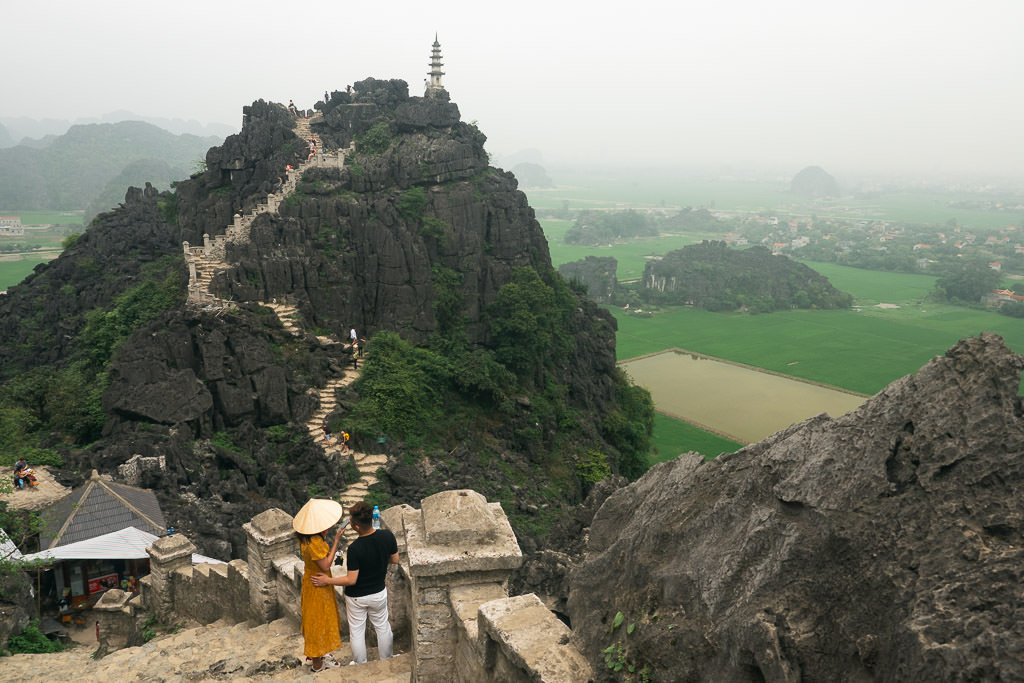
I’ve done two month-long trips in Vietnam, both following a north-to-south route. My first trip followed more or less the typical Vietnam itinerary, while my second trip (a few years later) was more focused on going off the beaten track.
While my first trip made me think of Vietnam as a bit too commercialized in places, my second trip gave me a whole other perspective, easily turning it into one of my favorite destinations.
Plan your Vietnam backpacking trip
How to plan a route
There are a lot of places to explore in Vietnam and it’s impossible to cover them all in one trip. In this map below, I show some of the most common travel destinations:
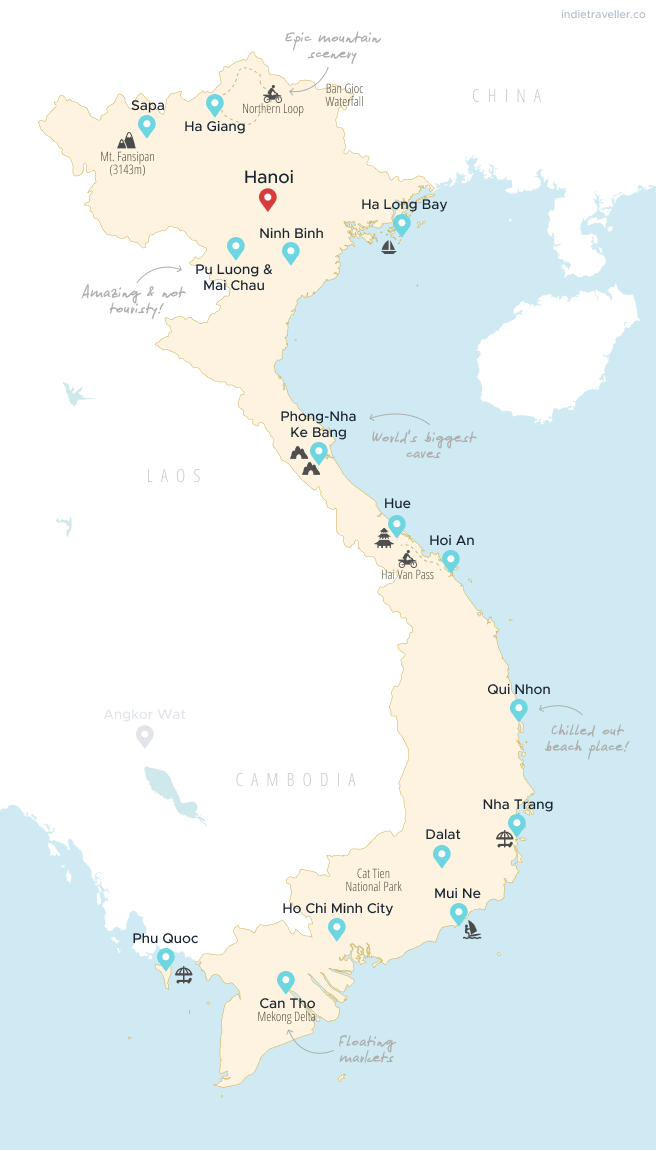
How much time needed
If you want to do the north, center, and south of Vietnam, honestly the more time you have available the better.
This country is bigger than you might realize from seeing its thin shape at a glance!
Vietnam’s length is similar to that of Japan including Hokkaido or almost the entire West Coast of the USA. The total driving distance from the north to south tip is more than 40 hours.
Keep these distances in mind when planning your trip. Night buses and overnight trains can be a good way to efficiently cover more ground and they’re very budget-friendly too. I’ll talk more about this later.
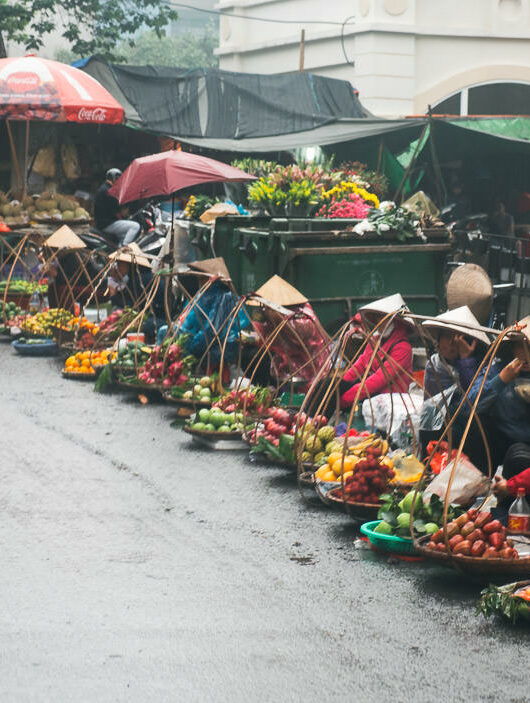
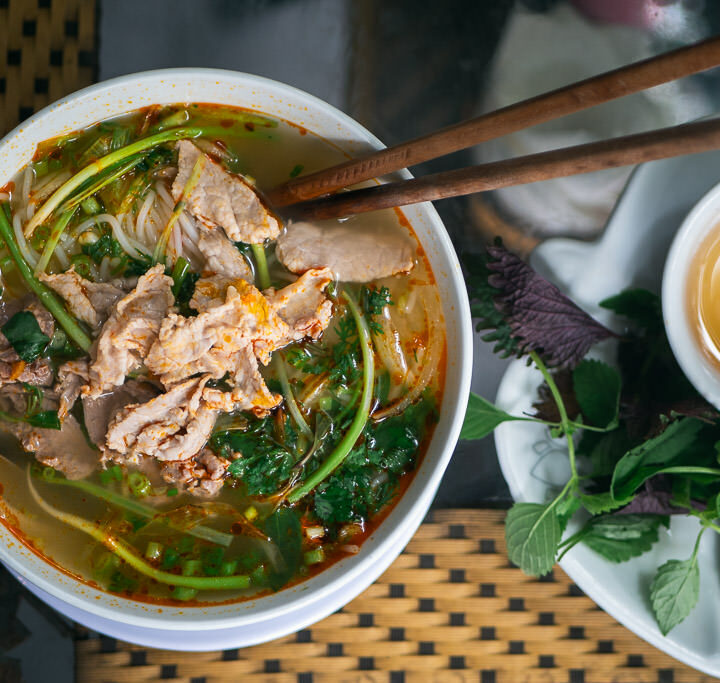
Despite its considerable size, many travelers try to cover the whole length of the country in one trip. To do such an itinerary justice I think you need at least 3 weeks but ideally 4 weeks.
Even if you have 3 or 4 weeks to spend, you will probably have some tough decisions to make on what to include in your route.
Planning a shorter trip
If you have only one or two weeks in Vietnam, then consider focusing on just the north + center, or the center + south. There’s no shame in doing fewer things but doing them properly!
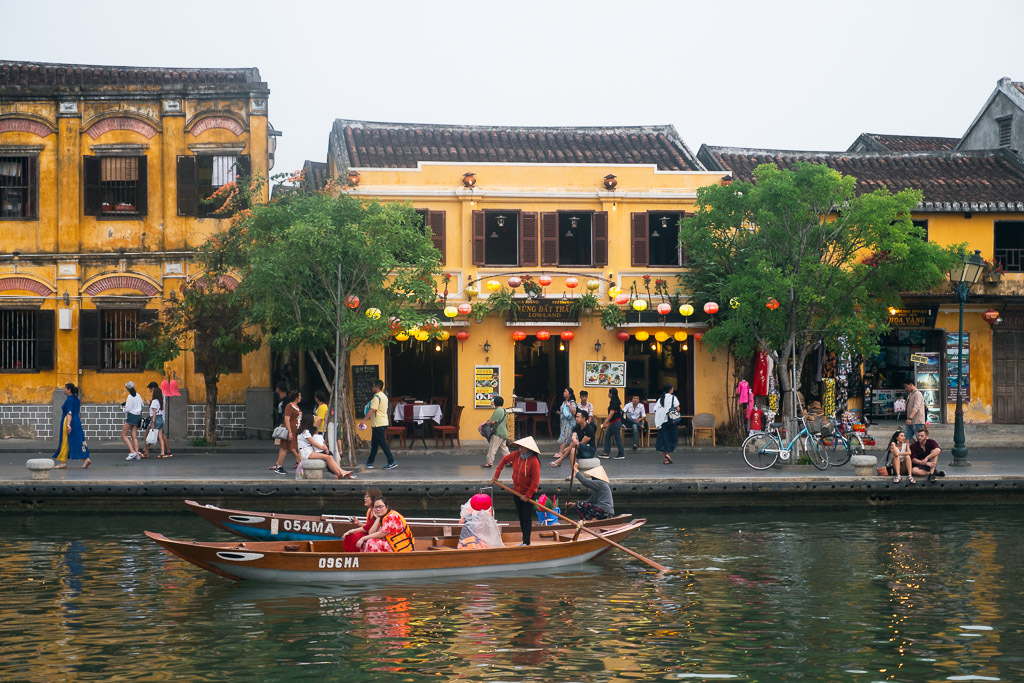
On my first backpacking trip in Vietnam, I actually didn’t see much in the north. It was still very cold and misty there in December, so I skipped entirely over some popular places in the north like Sapa.
On my second trip, I skipped a lot in the south instead. I just felt more like seeing the northern mountains than the southern beaches. In both cases, I had an amazing time.
All I’m saying is that you don’t necessarily need to include everything to have an incredible trip. It is possible to create a trip that’s focused on just a part of Vietnam.
Places to visit in Vietnam
Some places in Vietnam are very popular and most people end up including them in their itinerary. The main ones are:
- The capital Hanoi
- The northern mountainous region, usually the town of Sapa, which is famous for its rice terraces and mountain treks
- The archipelago of Ha Long Bay, a collection of thousands off small limestone islands of the coast that you can see as part of a sailing trip
- The cute riverside town of Hoi An — super touristy but still a very atmospheric town with many things to do
- The imperial city of Hue, home to many temples and pagodas
- The cosmopolitan southern city of Ho Chi Minh City (a.k.a. Saigon)
- A trip to the Mekong Delta. Here you can see floating markets on the rivers, where loads of little boats converge to sell fruits and vegetables.
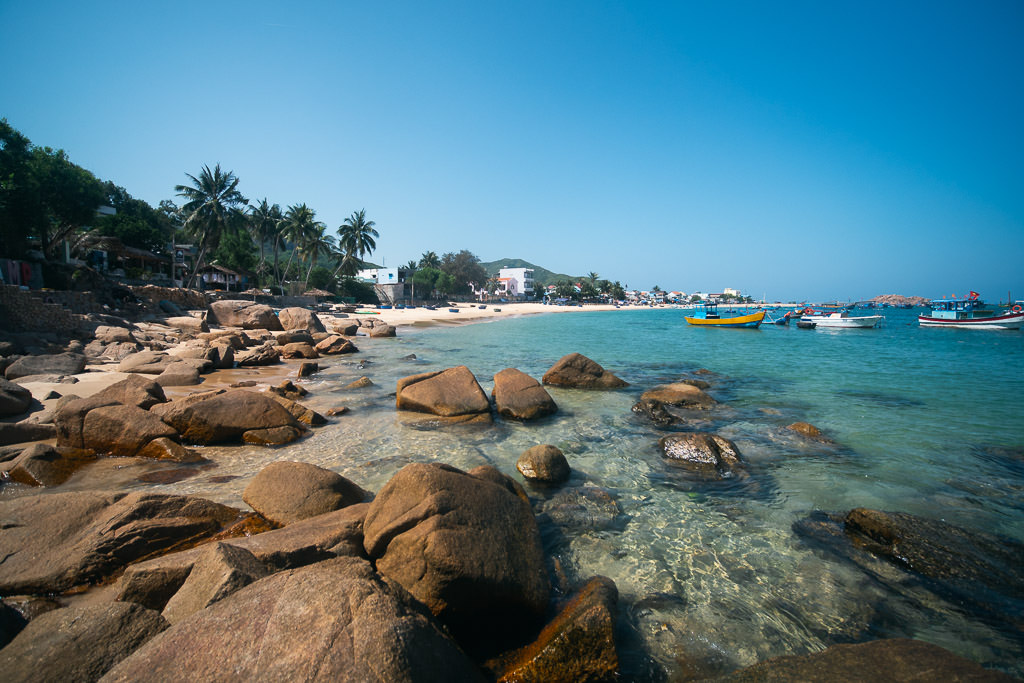
Many backpackers also stop by the seaside resorts of Nha Trang or Mui Ne. These places sometimes get mixed reviews — honestly, they’re nothing mindblowing, but they can be fun unpretentious places to party or hang by a swimming pool. I’ve enjoyed the quieter beaches around Qui Nhon and there are some decent beaches around Hoi An as well.
Some places are not in every itinerary but I think they are awesome and highly worth visiting, such as:
- Ninh Binh, sometimes called the Ha Long Bay on land
- Phong Nha, home to the world’s largest caves
- Ha Giang Province, a stunning mountainous region best explored by motorbike
Heading north or south?
When you meet backpackers in Vietnam, one of the first questions you’ll surely hear is “are you going north or south?”.
Because of its elongated shape, it just makes sense to travel from Hanoi to Ho Chi Minh City (a.k.a. Saigon) or the other way around.
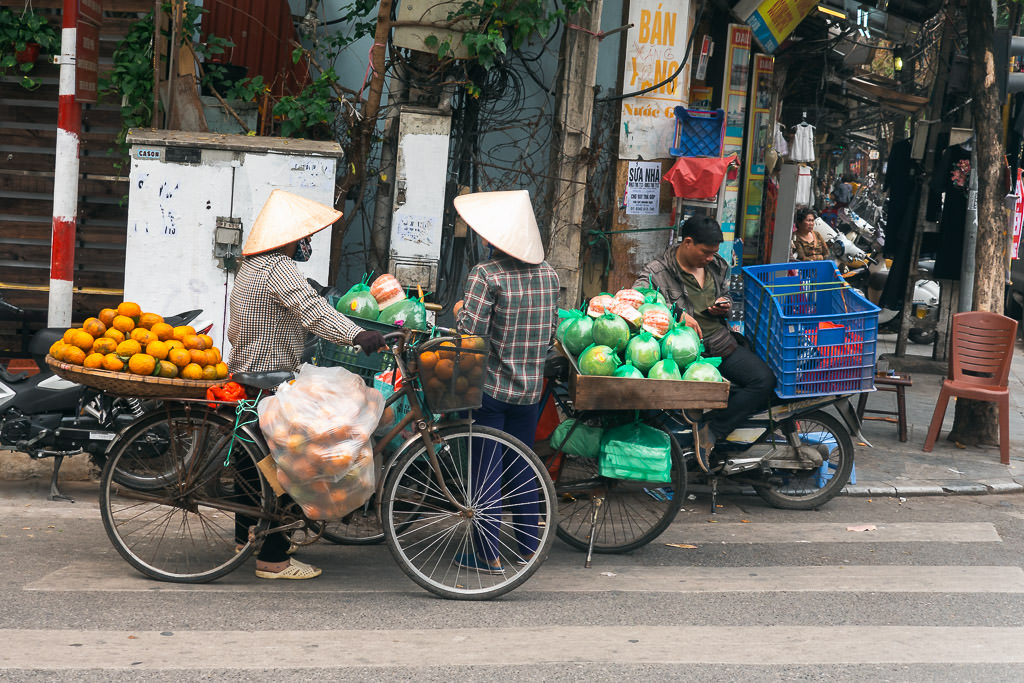
Personally, I prefer going north-to-south. That’s in part because the north is just a great place to start. The weather will also get more tropical as you go south, so you can reward yourself with some beach time towards the end of your trip. Plenty of backpackers do it south to north, though.
The topography of Vietnam makes it a great place to be a solo traveller. People generally move in only one of two directions, so it’s easy to make friends and continue to see familiar faces whichever way you go.
Recommended hostels in Vietnam
$$ Hanoi
Luxury Backpackers
Custom-built cabin beds but still just $8 a night for a dorm! Offers private rooms as well.
$$ Hoi An
Seaside Bungalow Hostel
Escape Hoi An's tourist zone and stay on the beach! Easily visit the town by bicycle or free shuttle
Getting your Vietnam visa
You need a visa to enter Vietnam. In 2023 Vietnam changed its visa system, making it way easier and more flexible.
- The new e-visa lets you stay for up to 90 days
- It can be used to enter Vietnam multiple times using any airport or overland border.
- It costs $25 for a single entry or $50 for a multiple-entry visa
You can apply for an e-visa here. (Be sure to switch the site to English in the top menu.) There are still some agencies that can help you with traditional visa requests, but this won’t be necessary for an e-visa.
For a select group of countries, there is also a visa exemption. For example, travellers from Denmark, Finland, France, Germany, Italy, Norway, Spain, Sweden and the UK do not need a visa at all and can stay visa-free for up to 45 days. You can check the full list of visa-exempted countries. If you need to stay longer, you can get the e-visa instead.
Getting your insurance
Travelling in Vietnam can be a little adventurous: you might even find yourself jungle hiking, riding motorbikes through crazy traffic, maybe trying out scuba diving or kite surfing in Mui Ne.
But unforeseen situations can really happen anywhere, which is why I always recommend getting travel insurance. That way, you’ll be covered in cases of theft, medical emergencies, cancellation, and much more.
I use Heymondo, which has some great flexible backpacker insurance. Their default maximum trip length is 60 days, but they also offer insurance for long-term travel or the option to extend your plan during your trip.
Budget-friendly insurance for Vietnam
Travel Advice
Travel insurance will cover you for theft, medical expenses, cancellation, and more. Heymondo offers great coverage, no excess or deductibles, and an app with 24/7 assistance & doctor chat.
5% Off With Indie Traveller
Avoiding the tourist traps
Okay, time for what might be the most important section of this guide!
To tell you the truth, Vietnam doesn’t always give the best first impression. Ha Long Bay and the Mekong Delta can easily feel like ‘tour factory’ destinations. Some tourist hotspots are also overdeveloped. This can easily give you the wrong impression of Vietnam.
When I ‘did’ Vietnam the first time, it sort of subjectively felt like a 7/10 destination. Some things were pretty awesome, but I also wasn’t immediately dying to go back. When I eventually did revisit Vietnam, it easily became a 9/10 for me.
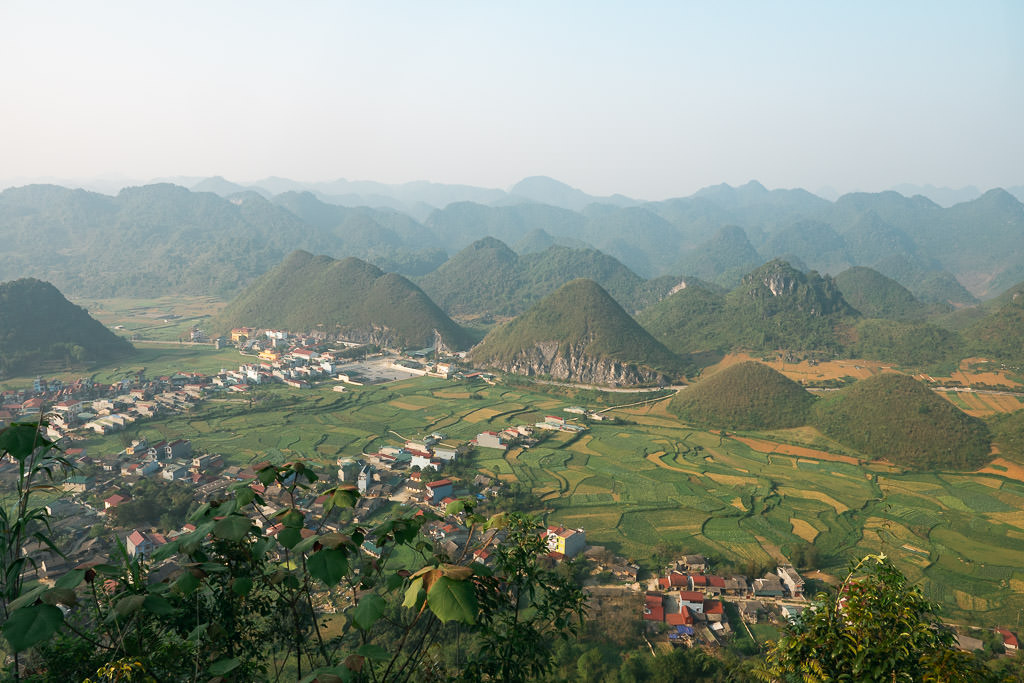
I realized that certain experiences like the Ha Long Bay cruises have really been packaged for the masses, focusing on quantity over quality. If you don’t go with a high-rated tour, you might find yourself getting shuffled around like cattle, mixed in with other groups, or led by impatient and humorless guides. Scammers and pushy salesmen are also an issue in some of the tourist hotspots.
Luckily, by exploring independently or taking alternative tours, you will often have a much better time.
And chances are, you’ll get to know a way more welcoming and friendly side of Vietnam.
The following tips can help you avoid Vietnam’s main tourist traps…
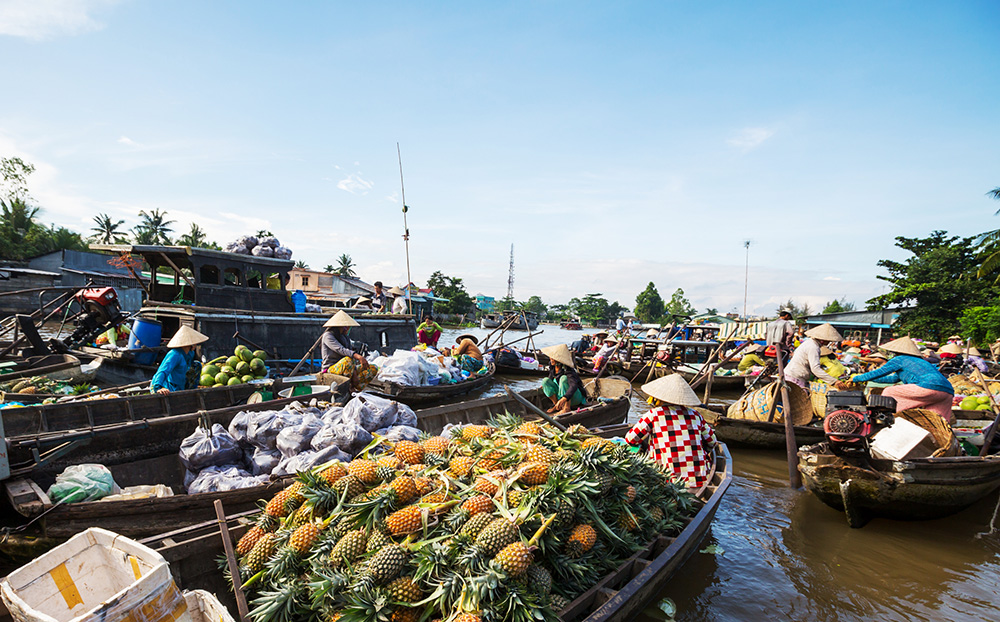
Mekong Delta tours
The Mekong Delta region is a vast maze of rivers, rice paddies and riverine islands in southern Vietnam. The typical way to visit is with organized trips, either day-trips from Saigon or 2-day tours.
These usually include a brief visit to the floating markets of Can Tho, a staged photo opportunity where you wear a conical hat while paddling through a bit of bamboo forest, as well as a few other touristy sights. It’s fun, but not that authentic. If you do them as a day trip from Ho Chi Minh City, it’s also a long day with a lot of driving.
A better way to do it: make your way to the city of Can Tho and stay a night in the Green Sunshine Homestay (or find other accommodation). At the homestay you can have breakfast on the river and do a local floating markets tour through them. By starting early, you’ll beat all the daytrippers and will experience the true hustle and bustle of the market during the early hours.
In the afternoon, you can rent a motorbike or bicycle and explore the rice fields by yourself. You’ll get a true taste of rural life in Vietnam and the riverine landscapes of the Mekong Delta.
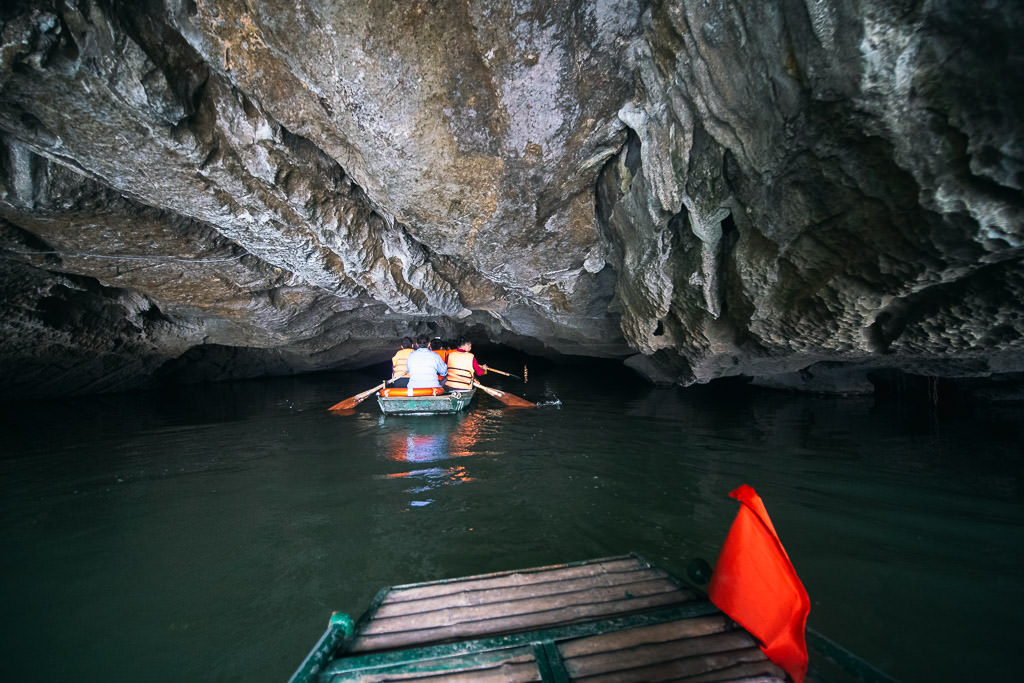
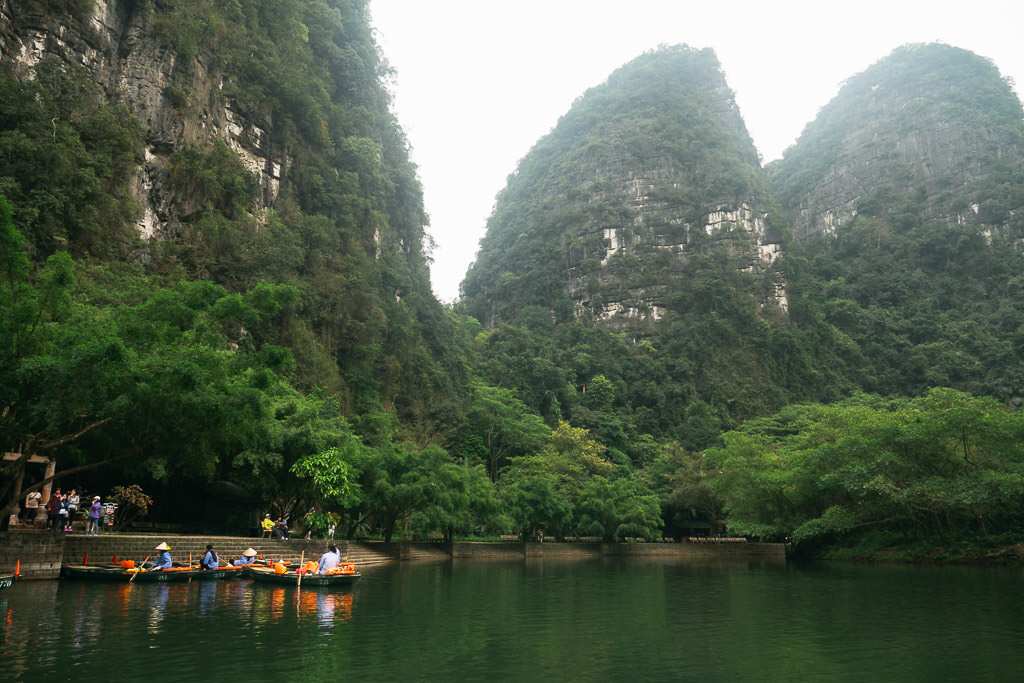
Tam Coc boat rides
The karst landscapes of Ninh Binh are sometimes called the ‘Ha Long Bay on land’. While the mountains are a bit smaller (and, obviously, on land) I think the area here is one of the real highlights of Vietnam. I have an in-depth guide to Ninh Binh, but will share my main tip here.
The popular riverboat ride in Tam Coc is known to be a bad tourist trap with a lot of scammy behaviour from the boat drivers. Every backpacker has some different story about how they were forced to buy things or got a ton of grief for not giving more money.
A better way to do it: ignore the Tam Coc tourist trap and go for the better Trang An boat ride. This one starts about 20 minutes further north (and not inside the town). It’s best to choose the longer Route 1, while most day-trippers and groups take the shorter Route 2 or Route 3. It’s an amazing experience with none of the hassle.
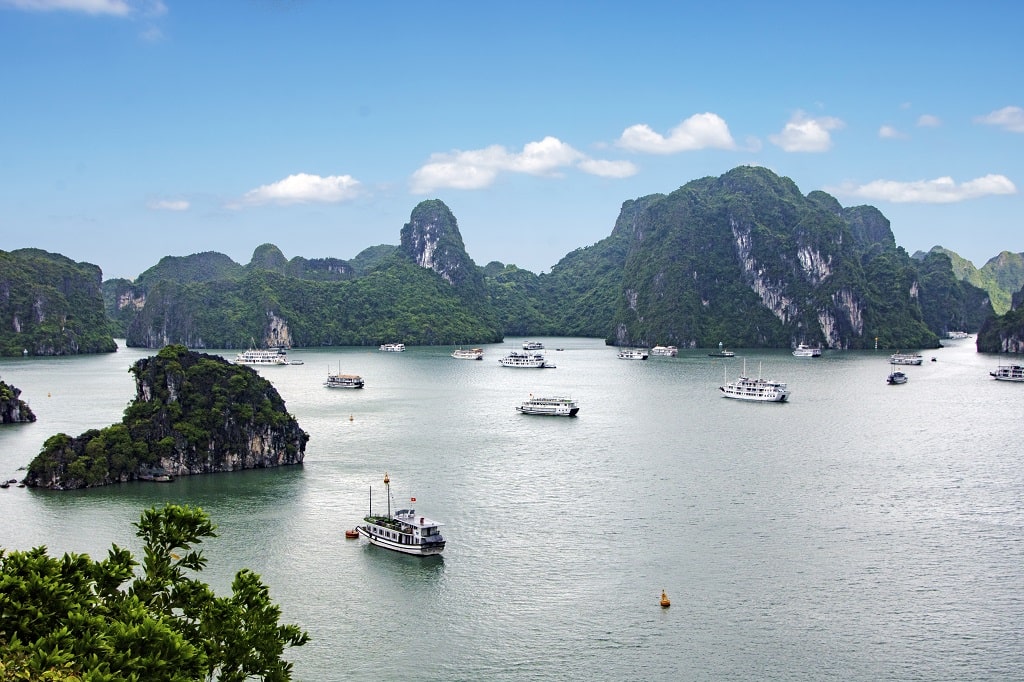
Halong Bay cruises
Nearly everyone on their first visit to Vietnam wants to see Halong Bay, so there are tons of companies running tours there of varying quality. The location is magnificent and worth seeing, but the overall experience will depend hugely on the tour company. Since it’s on the water you can’t do it independently; you have to go on an organized boat tour or cruise. This limits your options a bit, but there are still some ways to have a slightly different Ha Long Bay experience.
A better way to do it: Inform yourself about the tour options and their routes. Consider tours that include Bai Tu Long Bay or Lan Ha Bay. These bays are a bit further out so they don’t have as many boats. You could also choose to stay on Cat Ba Island (the big island near Halong Bay) and take a day trip from there in the morning — you might just beat the rush of tourists coming in from further away like Hanoi. You can book a trip to Lan Ha Bay starting in Hanoi here.
Most travelers agree that Halong Bay is pretty epic, but know that it’s getting busier every year. As long as you don’t expect to be alone, you can enjoy the experience.
How to get around in Vietnam
Getting around in Vietnam usually isn’t too difficult. It has a great bus network and the Reunification Express railway running from Hanoi to Saigon also lets you easily cover a lot of miles.
That’s not to say your journeys will always be comfortable though; local buses can be slow and most night buses have awkward bunk beds with not much leg space. Sometimes it’s worth spending a bit more on a 1st class train ticket or ‘VIP’ bus service for a bit more comfort if you have the budget.
How to book buses or minivans
Bus services in Vietnam are run by hundreds of different companies. Luckily, local specialized booking sites like 12Go Asia and Baolau.com make it easy to book buses, trains, ferries, or minibuses online.
Do keep in mind there is no centralized booking system in Vietnam. In most cases reservations are not instant; the booking site has to manually call the bus operators to confirm. That’s why it can still take a few hours after booking to receive the actual ticket in your e-mail, so don’t leave it to the last minute!
Another way to book is via your hotel or hostel reception (who will make a call for you) or at any of the small ticket agents that you’ll inevitably find in any place that any tourists go.
How to book trains
The trains in Vietnam do have a central booking system. In fact, you can now only book trains online.
Trains are slower and somewhat more expensive than buses but, if you ask me, they’re also much more comfortable. I’ve caught far more sleep on night trains than on any of the buses. They’re also a cool way to travel!
Upon booking, you’ll be sent a PDF document with a QR code and your carriage and seat number. You can simply show this on your phone to the attendant. Every carriage has its own attendant, so there’s always someone to help you find your seat.
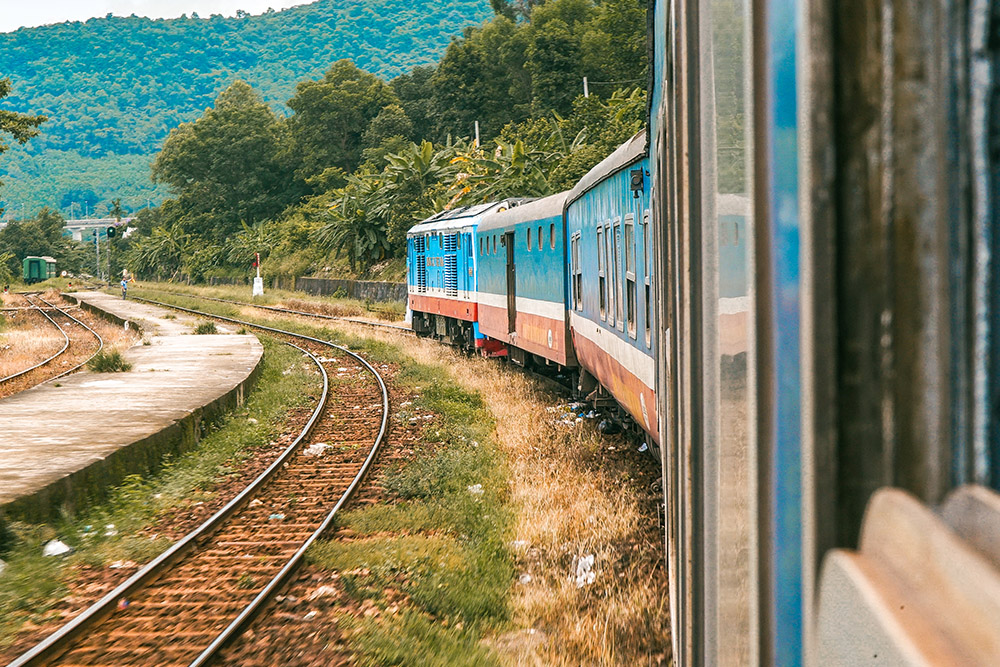
Note that you can’t book trains directly with Vietnam Railway as they still only accept Vietnamese payment methods, so you have to book with a booking platform like 12Go Asia (they charge a 40,000 dong commission).
It’s best to book trains at least one or two days ahead of time, as they do fill up pretty quickly. There are no hop-on-hop-off tickets for the train, so you’ll have to buy individual tickets for each part of your journey.
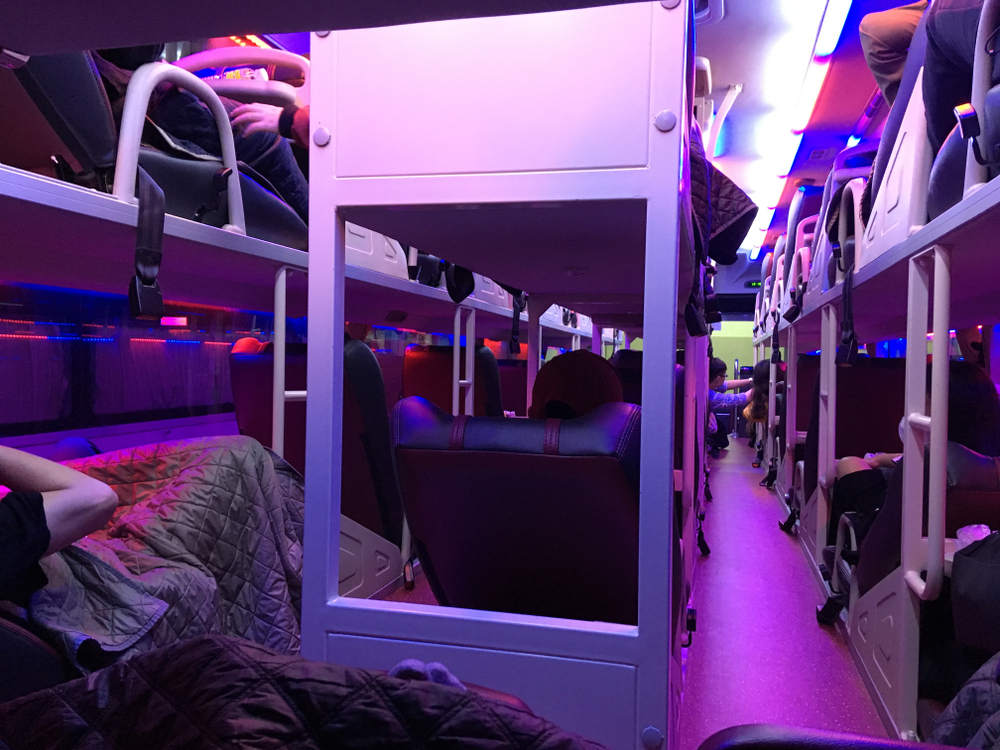
Traveling at night — is it worth it?
Yes, I think it’s often worth it in Vietnam. Many backpackers travel overnight, which makes sense given some of the distances involved. Travelling at night can save you time and money: you’ll spend fewer waking hours in transit and you get to save a night’s accommodation.
But be warned that not all forms of night travel are very comfortable!
Normal night buses: Vietnamese night buses typically have 3 rows of bunk beds stacked two levels high. The beds have a plastic casing around them which is quite restrictive especially if you are tall. There are usually no toilets, so the bus has to take regular toilet breaks that interrupt the journey. At the back, there is usually a large flat space that will accommodate about four people. These may seem like prized spots at first, but the lack of barriers will make you move constantly and may lead to involuntary spooning of some unwashed stranger.
What I’m saying here is that the regular night buses aren’t all that great. But… they’ll get you there.
VIP/luxury night buses: Unless you’re traveling on a very tight budget, be sure to keep an eye out for any upgraded ‘VIP’ buses, which operate between only some destinations. I took one of these from Hanoi to Ha Giang, for example. For just $8 more I got myself a private cabin with a comfy massage bed, USB chargers, snacks, A/C, and more. I thought this was 100% worth it.
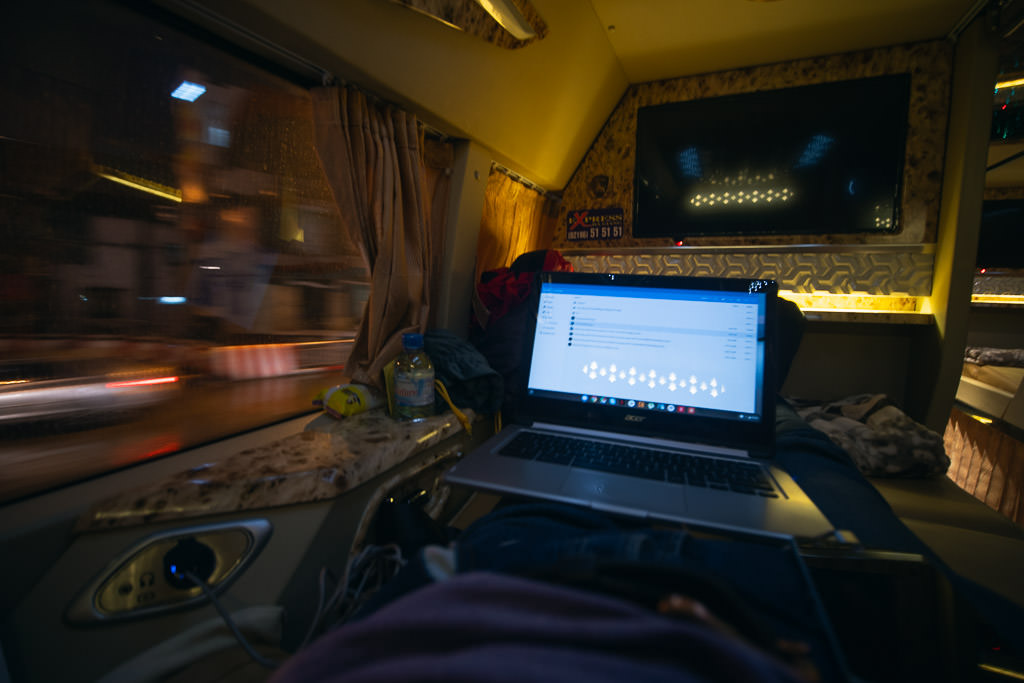
Night trains: There is a choice from various classes of seats and beds on the Reunification Express. The 2nd class berths have 6 beds in them. They’re quite cramped and there’s not enough room to sit upright. They also might have people sleeping on stretchers in the hallway outside and I’ve also seen certain, uhh, six-legged insects crawling around the 2nd class carriages (sorry… I thought you should know). The 1st class (soft sleeper) carriages have 4 beds and are a lot more comfortable and clean. 2nd class is probably fine for a budget backpacker, but the 1st class upgrade is worth it if you can spare just a bit of extra dong.
Hop-on-hop-off buses — are they worth it?
Several operators sell hop-on-hop-off bus passes for Vietnam. This means you can travel the full length of the country (between Hanoi and Saigon) on one ticket heading in one direction.
That may sound convenient, but it does reduce your flexibility a lot. Friends of mine did this but felt constantly restricted in which buses they could use. They were also unable to switch to trains or minivans for particular legs of the journey where these would have been more convenient.
I’ve always booked my transportation one step at a time. Even if the hop-on-hop-off ticket is slightly cheaper overall, it’s not so great to have to lock yourself in. In my opinion, this makes them not really worth it.
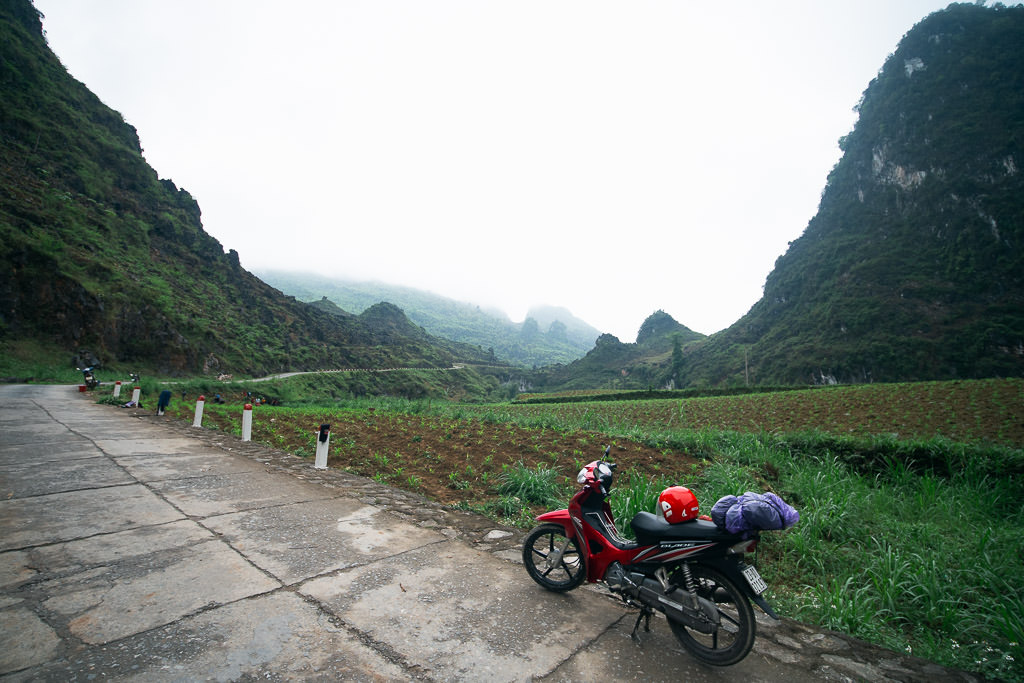
Motorbiking in Vietnam
Arguably the best way to explore Vietnam is by motorbike. The feeling of freedom you’ll get is amazing. You’ll also be able to go off the usual travel circuit, getting you much closer to the real country of Vietnam.
There is an active second-hand market with travelers (and locals) buying and selling motorbikes. It’s not too difficult to find one in Hanoi or Ho Chi Minh City, the common starting points for a journey.
Some companies even specifically target motorbike travelers with rental or tour services. One of the first companies to do this was Easy Riders (and there are now many copycats with similar names). If you don’t know how to drive, these let you rent motorbikes with drivers.
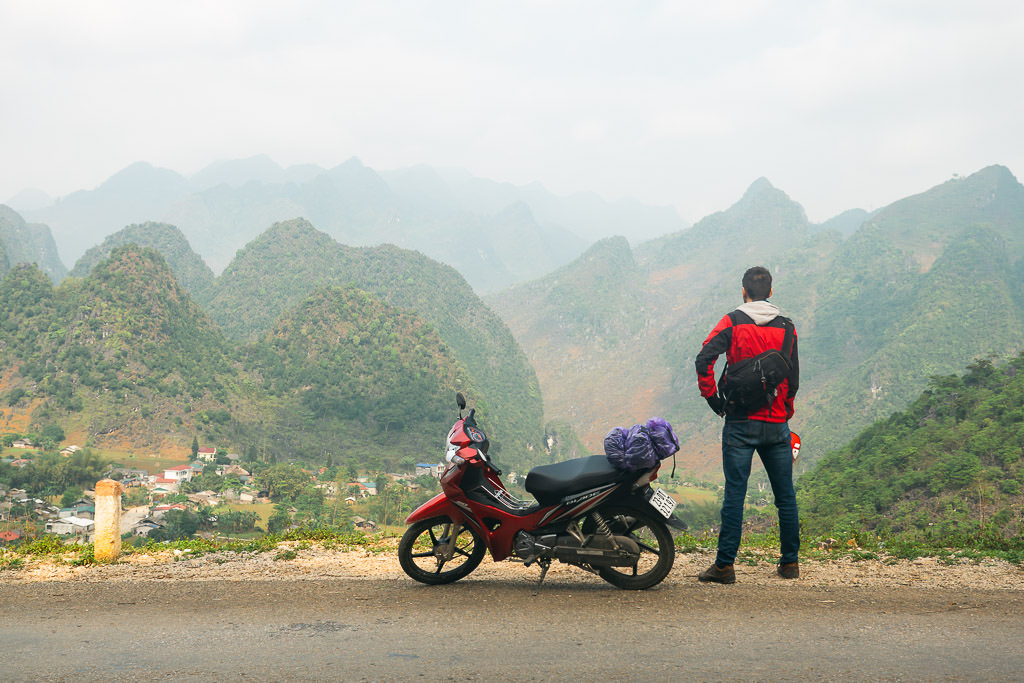
Even if you’re not doing a grand tour of Vietnam, it’s great to rent motorbikes for a few days here and there in each location. Scooters (by which I mean small motorbikes) are the most common mode of transportation in Vietnam and so you can rent them pretty much everywhere. This usually costs around 100,000 VND per day, but it depends on the type of bike.
Several scenic routes are especially popular with self-drive travelers. Consider for example the incredible Ha Giang loop in the north, or the Hai Van pass in central Vietnam. The local blog Vietnam Coracle is a fantastic resource describing many more alternative routes. You’ll also find many tips in our guide to motorbiking accross Vietnam.
Taxis & local transportation
Local taxis are inexpensive by Western standards — but do keep an eye on the meter, as not all drivers are honest! An easy way to book taxis or motorbikes is the Grab app. It will also help with the language barrier as you can simply type in your destination. With Grab you still pay in cash, but hail taxis via the app in a manner similar to Uber or Lyft.
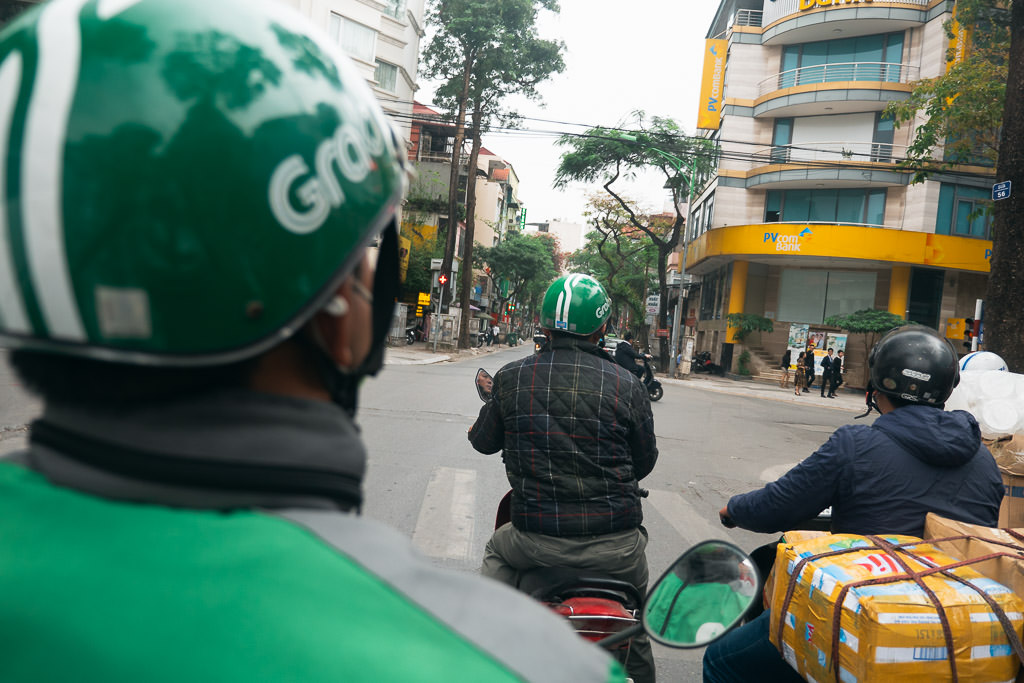
Finding hostels & hotels
Accommodation is very cheap in Vietnam. You can already get a great private room for around $20 per night, or a dorm bed under $10.
Hostelworld is always the best site to check if you’re intending to stay in backpacker hostels. The best hotel booking sites, in my opinion, are Booking.com and Agoda, as they list a lot of smaller and cheaper places.
One important thing: words like ‘homestay’ or ‘eco-resort’ are used pretty liberally in Vietnam. Often this is just empty marketing used by regular hotels or guesthouses. For example, while there are real family-style homestay experiences, some ‘homestays’ are just commercial hotels or bungalows. And nothing might be particularly ‘eco’ about a place except that it’s just near some nature. Check the descriptions so you know what to expect.
Best time to go to Vietnam
You can’t go to Vietnam expecting the weather conditions to be ‘perfect’ if you’re going to travel all of it.
There’s no way getting around the fact that the climate is just very different in the north, center, and south, which are very geographically separated.
While much of the country is tropical, keep in mind the north is in a temperate zone. Expect the mountainous north to be a little cold in winter. Even in autumn or spring it can be a bit cold at night. Pack a hoodie, and maybe a jacket for winter. If you’re going in summer, expect it to be very hot and humid.
The north also tends to be quite cloudy and misty for much of the year (because of both weather and smog). The best chance of clear skies in Halong Bay is in April to June, and September/October.
For central and south Vietnam, the wet season is something to keep in mind. For central Vietnam (e.g. Hoi An, Hue, Da Nang) this is in October / November. In the south (e.g. Ho Chi Minh City) it’s May until October.
Best beaches in Vietnam
If you’re hoping for super dreamy beaches that look straight out of a travel magazine (or influencer’s feed), then Vietnam is maybe not the first place to look.
While the beaches can be quite nice, in my opinion they’re nothing like the unspoiled and stunning beaches you can more easily find in Malaysia, Indonesia, or The Philippines.
Not to sound negative — it’s just my honest opinion. If you’re coming for Vietnam just for beaches maybe it’s not the ideal place to go, but if you just want to add some relaxing beach time to a cultural trip in Vietnam, then there are many great beaches to choose from.
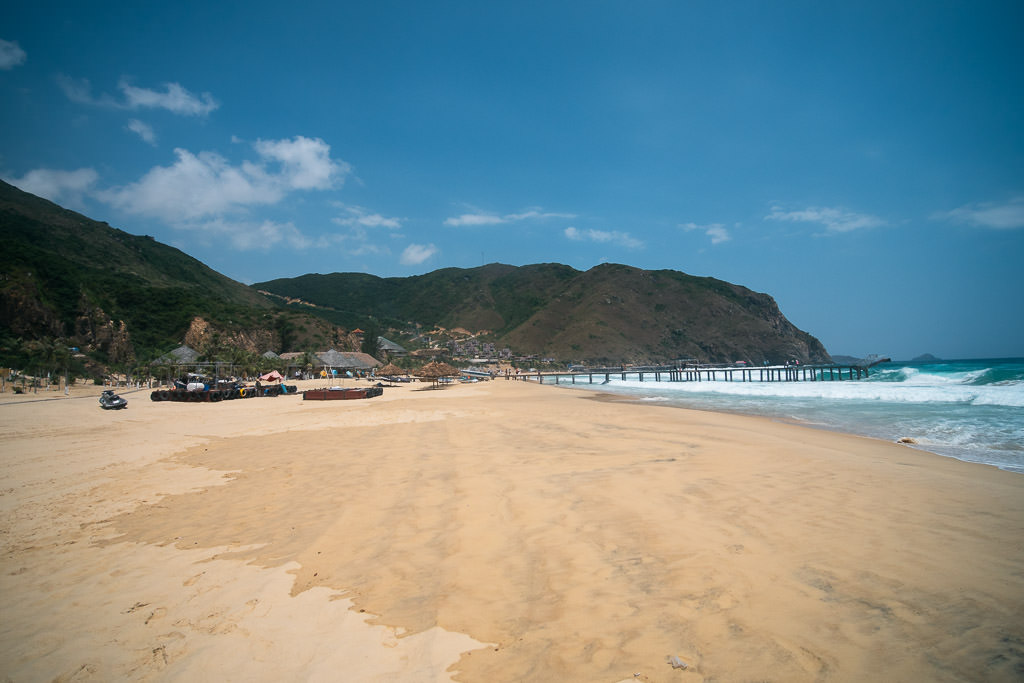
The top beach destinations tend to focus a lot on large-scale tourism.
Phu Quoc Island is a massive resort island (with big hotels, golf courses, its own airport, etc.) which maybe isn’t the vibe you might want as an independent traveller.
Mui Ne has only a thin strip of a beach, much of it paved with concrete blocks to prevent erosion.
Nha Trang meanwhile mainly targets Russian and Chinese package tourists, though it can be a fun place to party.
I like the beaches of Qui Nhon, which have more of a laidback vibe. Other travellers have recommended to me the island of Con Dao. The beaches near Hoi An or Da Nang can also be quite pleasant.
As far as snorkelling or scuba diving goes, in Vietnam it’s sadly just OK at best. There’s not a lot of life due to overfishing and visibility can leave much to be desired, at least compared to other spots around Southeast Asia. Keep your scuba diving budget for other countries, unless you’re just doing your training dives.
Food in Vietnam
Vietnamese food is simply amazing. But it’s not only about pho noodle soup or spring rolls! These are things you may already be familiar with from Vietnamese restaurants, but there is a whole other world of Vietnamese food to taste.
The best way to experience it is to dive headfirst into the street food. Sit down on one of the plastic chairs and point at anything that looks tasty.
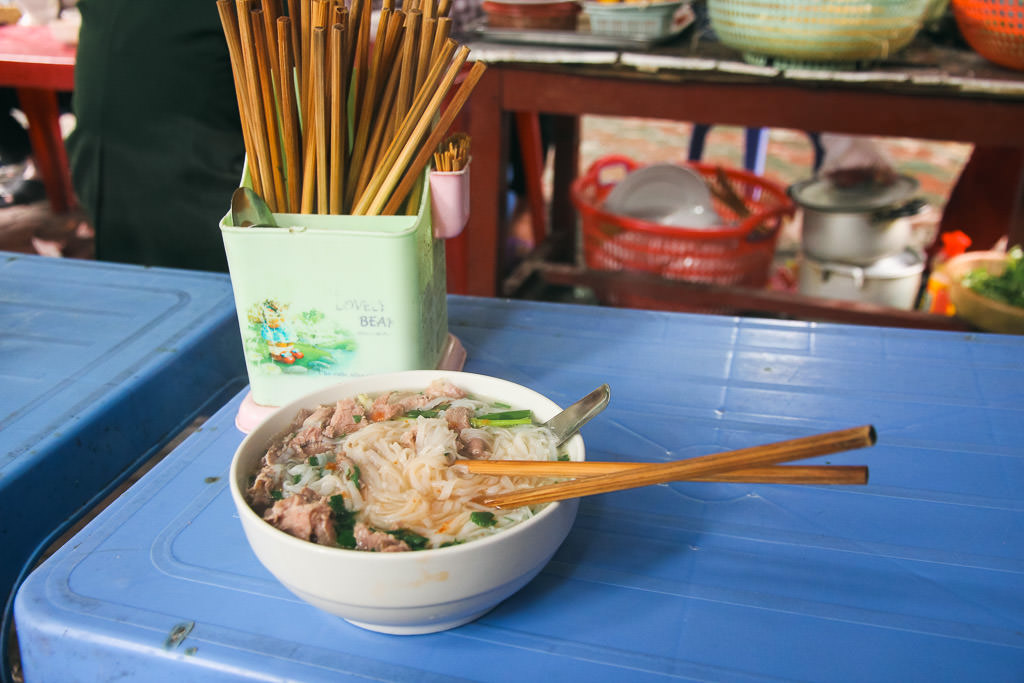
Sadly, many backpackers end up ordering only bland or generic ‘chicken stir fry’ or ‘noodle soups’ from tourist menus. There’s nothing wrong with these, but there’s loads of other delicious stuff to try in Vietnam.
Parts of the country also have their own specialities. One of the best things you can do in Vietnam is to take a guided street food tour in Saigon or Hanoi, as this will give you an incredible crash course in all that’s there on offer.
Backpacking Vietnam: my impressions
I had a great time on both my journeys through Vietnam. However, my first introduction to Vietnam (when I was a less experienced backpacker) didn’t always go smoothly.
I was scammed more often than I’d ever been, including by a taxi driver trying to charge $80 worth of dong for a 5-minute trip (and getting aggressive when I refused), a restaurant switching their menu for another one with much higher prices, and many other such shenanigans. It made Vietnam feel less welcoming and soured my mood on many occasions.
On my second trip, I had no such difficulties and I discovered how kind and welcoming the Vietnamese truly are. Maybe I just knew to expect scams and annoyances this time and automatically avoided them, or maybe Vietnam has just chilled out a bit in more recent years. It also helps to have apps like Grab now so you can entirely avoid scammy taxi drivers.
All in all, I believe Vietnam is one of the most exciting destinations in Asia, especially from a cultural, culinary, and adventure point of view. It maybe doesn’t have the best beaches, but backpacking in Vietnam is about so many other things than that.
Consider places not yet touched by mass tourism like Ha Giang region, Phong-Nha, and the beaches around Qui Nhon. Or go on a homestay in Sapa, visit the national parks, embrace the chaos of Hanoi, or go on a motorbiking trip through rural Vietnam. I guarantee you will come back with some incredible memories.
Some links may be affiliate links, meaning I may earn commission from products or services I recommend. For more, see site policies.
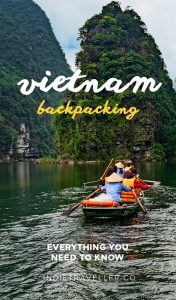
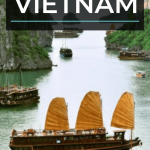


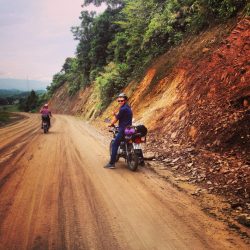

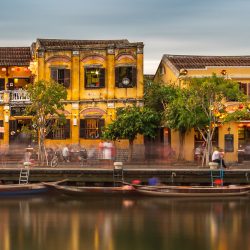
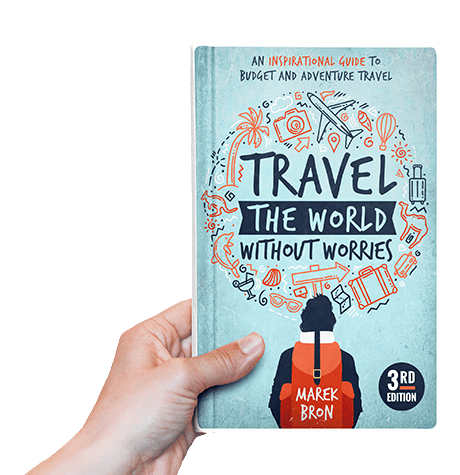



Really wanting to explore some of the outdoors/nature that Vietnam has to offer, so guess what I am between is:
1a) Fly into Hanoi (2-3 nights), fly/train to VDH / Phong Nha (2-3 nights), night train to Ninh Binh (2 nights), fly out of HAN
1b) Fly into Hanoi (2-3 nights), train/taxi to Ninh Binh (2 nights), night train to Phong Nha (2-3 nights), fly out of VDH
2) Fly into Saigon (2 nights), fly to VDH / Phong Nha (2-3 nights), fly to Hanoi (2-3 nights), fly out of HAN
3) Fly into Saigon (2 nights), fly to HAN / train/taxi to Ninh Binh (2 nights), train/taxi to Hanoi (3 nights), fly out of HAN
Curious if you have an opinion on which of these would be best or if you would rank them a certain way, or if you recommend something completely different! Looks like all flights in/out of VDH are in the morning.
Hi Marek,
Love your post and your site! Traveling solo to SE Asia next month and I’m spending ~7 days in Vietnam (HCMC 2 nights, Hoi An 2 nights, Hanoi 3 nights) and ~11 days in Thailand (Chiang Mai 4 nights, Krabi 3 nights, Bangkok 4 nights).
I keep going back and forth on my Vietnam itinerary, as 7 days is not a lot of time. I keep reading how touristy Hoi An is, so I am leaning towards scratching it from my itinerary.
Your website brought my attention to Phong Nha which looks incredible… would you recommend replacing Hoi An with Phong Nha? Am I better off removing Hoi An and focusing solely on HCMC and Hanoi (possibly some time in Ninh Binh)? Appreciate any recommendations/advice! 🙂
Hoi An is definitely a tourism honey pot and not hugely my thing. It’s a lovely town aesthetically but veeery busy. Most travellers I speak to in Vietnam adore Hoi An, so I do recommend it in many posts, but yeah. I’d go Phong Nha because I love exploring caves and you can see some rural Vietnam… rivers with water buffalo, rice fields, that kind of thing 🙂 Still quite pure.
Thanks for the feedback! Now the tough decision on which cave(s) to explore in Phong Nha!
If you had to pick one (or two) other places from Ninh Binh, Hanoi, or Saigon (to do in addition to Phong Nha), how would you rank them?
Hi! I booked a flight to Saigon and have 3 weeks to fill. Flight leaving from Bangkok. Do you have any recommendations on which route and cities i should visit along the way? Would appreciate any recommendations 🙂
So a route between Saigon and Bangkok? Then it’s worth looking at Saigon for several days, Mekong Delta, maybe a trip to Dalat, a brief stop in Phnom Penh, then Siem Reap, Battambang, & Bangkok. If you’re into beaches & islands then Con Dao, Koh Rong Sanloem, and the Koh Chang archipelago are all options worth looking at…
Hi Marek!
Thanks for the all the info, really loved it 🙂
I am travelling alone around Asia during 3-4 weeks. I am trying to decide between Vietnam or Indonesia. I am looking for nature, a bit of beach and a destinations where its easy to meet people (not not too touristic hopefully). From what I read in your posts both seem great options. Any reccommendation?
Thanks!!
Oof that’s a hard question! If Indonesia means Bali then it’ll be very touristic for sure, but perhaps an island like Lombok will give you a good balance between meeting people and not being too touristic. Vietnam is amazing (and extremely easy for meeting people). The beaches are a bit less beautiful than Indonesian ones (outside of Bali) in my opinion. But both are indeed great options and there’s no clear-cut answer!
Hi Marek,
I’m grateful for your useful travel blog. I will be visiting Vietnam for my first time in December for 3 weeks. I plan to only be in Northern & Central Vietnam. I’m trying to decide which rural sites for multi-day stays/tours. I’m hoping to do some trekking and exploring culture(textile, food) in these villages in addition to staying in Hanoi & Hoi An.
Can you rank Ha Giang, Pu Luong, Ninh Binh region, Phong Nha, and Mu Cang Chai in order of your preference for my itinerary?
I know I can’t see them all and some maybe similar to each other & redundant on the list.
Thank you for your kind consideration, Althea
Hi Althea. I’ve not been to Mu Cang Chai but I’d rate Ha Giang first, then Phong Nha, Pu Luong, and finally Ninh Binh. (Just my opinion.) Ninh Binh is technically a rural place but it’s very close to a city and it’s not the best place for trekking. I believe the first ones listed will give you more of a trekking/culture experience. Hope this helps!
Hello Mark
I am to set off in June for 3-4 months backpacking in Southeast Asia…the vibe of your article is exactly what I want. Stay away from the touristy area get a great feel for the country..you also mentions Vietnamese beaches aren’t that great compared to Indonesia and Malaysia….your second trip soundS exactly what am looking for in my month around Vietnam…could share that or give me some of the special off the beaten track places. Again thanks for your article.
Czesc Marek.
Liest sich super Dein Artikel. Im August 2019 geht’s bei mir und einer Freundin los.
Dzieki für die tollen Tipps 🙂
Czesc Kasia. Ich bin froh dass meine Tipps hilfreich fur dich waren! 🙂 Viel spass in Vietnam!
Great post mate, love your writing style. Keep it up!
Thanks Liam!
My understanding is that you wouldn’t need this if you get a pre-approved visa on arrival or a proper visa from an embassy. I’m doing the former right now and not being asked about this. Perhaps you need it if you make use of certain visa free options (some nationalities can stay visa free for 15 days but then maybe they’d want to see onward travel, not 100% sure though).
Found this post just in time!
I’m planning a trip to Vietnam and you definitely making things more clear.
I heard a lot about the local’s attitude toward tourists, I really hope it’s not much aggressive than other East-Asia destinations.
Tourists need to remember in that Vietnam they look like a bucket of cash. Tourist also need to judge character and negative blanket assumptions will rule out having any positive engagements with locals. When I was there quite a few people introduced themselves because they just wanted have a chat, some even showed me around. None of those people ever asked for anything of me, except once marriage. I was there for a month and all over and did not get ripped off with the exception of motor bike taxi drivers who never had change. If you are worried about loosing a dollar or two you should probably stay home.
Great post about Vietnam, however, I didn’t think much of Hoi An, although the town was beautiful, the amount of hassle I received while there made my time there miserable. Other than that I loved it in Vietnam.. One of my favorite countries to date! The Top Gear Experience from Hue to Hoi An was on of the most amazing things I’ve ever did in all my travels abroad..
Hi Marek,
Me and my friend are planning to have a backpacking trip to vietnam this coming march of 2017. Can anyone please help me if you have any idea how much would it cost us if we go from vietnam to cambodia and from cambodia to bangkok thailand. What are the cheapest transportation to go to cambodia from ho chi minh vietnam? Thanks a lot.
Hi Marek
thanks for sharing your experience of Vietnam, a friend and I are planning a visit there in Nov this year and was wondering if you could help with some advice we want to visit the main places starting from Ho Chi Minh and work our way north we have 10 day in Vietnam and plan only 4dyas in Laos
Is 10days enough? what are the must see/visit places you can recommend?
Thanks
Hi! My name is Michalah and I’m trying to plan a backpacking trip through Vietnam. I’m thinking summer 2018 because plane ticket prices are just so expensive! What was the best way to fly? What season did you go in? I’m a college student in Philly (hence the need for cheap flights haha) so I was thinking if I study abroad in Europe my sophmore year (my school lets me study abroad any year I want so it”s possible), I can find a cheaper flight from that country to Vietnam than from the US to Vietnam. Do you think that is plausible?
Also about how much did it cost to rent a motorbike in Vietnam? I’m planning this trip with some of my friends from Japan and Malaysia so I want to make sure I have everything good to go, or so, before I tell them the whole plan.
I loved your post! Thank you (:
Also! How did you work out your visa? Did you get the VOA or did you apply before you traveled?
I applied for one in Laos as I was travelling overland. You could go for a VOA if you fly direct into Vietnam, though these are not your typical VOAs – they’re offered by different companies at the airport, and you have to apply for them online in advance. Be sure to do a bit of googling if you decide to use one of these services to make sure they’re reputable (I’ve heard a few stories of scams and other issues). The other option is to get your visa via an embassy.
Hey Michalah. For plane ticket prices, I’m not sure! Check on sites like http://www.skyscanner.net or http://www.momondo.com and compare prices. Based on distance, it does seem likely you’ll be able to fly from Europe more cheaply. I’ve rented motorbikes for about $5/day in Vietnam.
Not all free guides are bad Marek. Check out the “Hanoi Kids”. They are an organization founded by a university lecturer where you can get students to guide you around Hanoi. Everything is on your own: tickets, taxi, your drinks, and food…they are even not allowed to accept tips but you can buy them drinks and food.
And rather than that I doubt. I’ve been a Vietnam tour guide for 15 years now and believe me no one have time to give you “free tours”.
Just posting to give people some perspective, as mentioned, everyone has different experiences of Vietnam.
I bought a motorbike off a Vietnamese man, Bao ‘Storm’ Nguyen. Due to the logistics of my journey, I passed through HCMC three times and he effectively gave me a free service each time I went buy. He was checking oil, chain and any issues, taking time to ask about our journey. He even took my friend to get medical assistance and translate the medicinal instructions for us. Upon leaving for the final time, he took me and my three companions to his home in the rural countryside where children had never met a foreign person. His mother, who spoke no English, cooked for us and taught us Vietnamese card games without any formal communication. The experience of that will live with me forever and I plan to return to Vietnam in January and meet up with Bao again for a few games of ‘bullsh*t.’
With regards to tourists being targeted for money – tourism is the main income for many people in Vietnam. It happens. Everyone is trying to make a living. Street vendors selling sunglasses, people selling $1 noodles, tour guides taking to you to targeted shops. It happens in Vietnam, it happens in the UK. Get over it. I find that being polite, and taking the time to learn “No thank you” in Vietnamese is the best way for this. Anytime I didn’t want anything being thrown at me, a simple Vietnamese reply got the person smiling and they were happily on their way.
Sidenote: the one time I needed to purchase sunglasses off of a street vendor, I had to wait 30 minutes for one to randomly appear. The usual bartering and getting the price down occurs. But thats part of the fun.
The main point I’ve got is, don’t rule a place out based on one persons bad experience. Likewise, don’t go based on my own good experience. Trust your gut. But just to throw some defence the way the Vietnamese people: despite their tough recent history, they have a simpler way of life, a happier way of life. Some of the most relaxing, enjoyable nights were spent sitting on the kerb of HCMC with a family having a few beers outside their shop, singing songs, exchanging stories in broken english, and watching the world go past.
Thanks for your perspective. I’m late to reply to this, but I just wanted to clarify that I wouldn’t ever object to people trying to make money. Some hassle is fine and expected. Like you say, this happens.
What soured my experience at times wasn’t people trying to sell sunglasses, but some people being extremely deceptive or unethical. For example, when someone comes to you pretending to be collecting money for the Red Cross, and you think you’re making a donation to help the disabled, but instead that person is actually just pocketing the money, that’s not okay no matter what country it is or how poor people are. I probably could expand on this a bit within the page itself, as I don’t want people to think that I’m merely complaining about pushy salesmen, which are to be expected everywhere. My issue is with the predatory scams that I encountered and of which I’ve heard other examples in Vietnam.
Needless to say I love the picture you’ve painted of the local experiences you’ve had! It’s important for people to know that this is the other side of travelling in Vietnam. The further you get away from the most touristy places, I think the more likely you are to have such experiences.
Totally agree with you Ryan! To travel to one place is to be ready for difference. Travel with an open mind and heart and take things easy. That’s the best way to help people enjoy their time in Vietnam- a developing country!
Hey Mark,
Iam from India and wanted to travel bagpack Europe this year,but visa didn’t happen, one of my friend strongly recommended Veitnam, I went through all the posts, i just want to know what about the language? How to interact with locals?
People who deal with tourists will generally understand at least basic English phrases. In other cases, non verbal communication works pretty well (such as pointing at an item on the menu to order it)
Hi Marek,
Can you help me on the people being rude aspect of locals in reference to type of plans I am making,
I am more of a peace seeker tourist than a traveler, I generally prefer to go somewhere and spend all the days at one or max two places, my trips are generally not more than 7 days, that is maximum me and my wife can afford at one time due to our jobs, I want to visit a cool, hilly areas, stay in a direct hill view room, walk or jog in nearby areas, for few days and return to Singapore, I am Indian, have you met any Indians there? Basically I want to avoid any kind of hassles that may arise due to interaction with rude and scamming locals,
Can you recommend something, where I can go, stay and come back without having to interact with locals much.
I would actually encourage you to interact with the locals! Despite some people taking advantage of tourists, I’ve met wonderful people in Vietnam. 🙂 Perhaps you’d like Sapa in the north, which is among green hills and rice terraces and pretty chilled out.
Fantastic post! We followed a fairly similar route in our 3 week backpacking trip to Vietnam… I would definitely recommend Tam Coc, it was one of our absolute favorties 🙂
Check out our blog for more inspiration and tips:
http://bonatravels.com/2015/09/28/country-summary-vietnam/
Hi Marek,
I am planning to meet a friend of mine in Vietnam soon. She is coming from Laos and I am coming from Bangkok. I thought it would be the easiest to meet with her in Hanoi and start from there our tour down and end up in Ho Chi Minh.
Do you think that’s doable in two weeks time without rush? Even if we can’t see everything I still hope its enough time to get a good impression about Vietnam (Hanoi – Ninh Binh with Tam Coc and Hoa Lu- Hue or Hoi An – Nah Trang and Ho Chi Minh)
The other problem I see right now is, I havent found a fast way to travel from Vientiane to Hanoi. Could you recommend sth? I only read about very long and a bit crazy bus tour with a lot of changes and stops between the two countries.
Thank you for your help!
Best,
Maren
Do you mean is it doable to see a lot of Vietnam in 2 weeks? Sure. Just fill your time with whatever you can or want to see.
The only fast way from Vientiane to Hanoi is to fly.
It’s funny that while you clearly warned everybody about the scamming culture of Vietnam, there are still Vietnamese people trying to scam people on your article by offering a ‘free’ tour for them to ‘improve their english’ 🙂
Or am I just paranoid?
Anyway, you wrote a very informative article!
I’m still doubting between Vietnam and Nepal
Hah you are probably right. I often have to skim through comments as there’s so many to moderate every day. I want to be open to genuine local guides, though I’d probably be sceptical of the ‘free’ ones too. 🙂
Scams are only in the big tourist places (Hanoi, Ha Long, Sapa, Mui Ne, Hoi An..)
You need to go also to another places. When are you traveling to northern Vietnam check my website about this beautiful and interesting area: http://www.north-vietnam.com
I travel to VN every year or so. Im a solo traveller, female in my 60s. I agree with you, there are scams to be aware of – especially on the well trodden tourist route, VInasun and Mailinh taxis are not all they are cracked up to be, especially in Ho Chi Minh City and Hanoi. Always record the drivers number when you get into a cab. If you get into difficulty with a cab and have that number most hotels will take action on your behalf. However, having said that I find Vietnamese people extremely hospitable and helpful as soon as you get off the tourist trail. Last year I spend 6 weeks in the Mekong Delta, in areas where I didnt see another European face for a week or two, and had few opportunities to speak English. No English was no barrier and I have had the most delightful experiences – and cant wait to get back!
Couldn’t recommend Vietnam enough. Just got back, visited Sa Pa, Hanoi, Saigon, and Da Lat. Here’s the GoOro video from the trip (watch in 720p)
https://m.youtube.com/watch?v=EqGsewWU5eo
Hi, what was the rafting/gorge-walking thing you did in Dalat?
Hello everyone! My name’s Hoang Minh Nguyen. I’m from Vietnam and livin’ in Ho Chi Minh City. I’m very pleasure if you guys wanna travel to my wonderful country. If you’re backpacking tourist(s), i’ll be very happy to help you have a memorial trip. contact me for more information ’bout destination, hotel, VN converting currency and so on. mail me at: snowbaby.1805@gmail.com. I do this FOR FREE cuz I wanna improve my English :lmao: see ya soon
Thanks for including me in your post! Lots of good info here. I was fortunate not to have any problems with scammers or unfriendly Vietnamese people – phew! I’ve read a lot of stories though. Also, I love the photo of the fishing boats in Mui Ne =)
Hello all, im travelling Vietnam South to North in December and am wondering whether to pay £600 to STA Travel for their tour of 12 days. This includes hotels, sleeper trains, meals etc and it may be advantageous in respect of me being an English traveller and they can show me the best places to go etc. I will be travelling by myself and as of yet have not made a decision whether to go alone or to join the tour group. The tour is 12 days long, however I have 19 days in Vietnam before my next flight to Bali. Any thoughts/advice from anyone would be greatly appreciated! 🙂 Jordan
Vietnam is easy to navigate independently and I’d say the language barrier is not a huge issue. I suppose your answer depends on how much you want this to be your own adventure. Do you want to meet people serendipitously in backpacker hostels, determine your own pace, and always decide what you want to see and do? Then doing it yourself is a better way to go. Going solo can feel a little scary but can be ultimately very rewarding.
Tours in my experience don’t really give you an ‘in’ on best places to go. They usually go to all the standard places that you can research yourself with a travel guide. Tours are primarily for convenience: you don’t have to worry about any trip planning, and you’re guaranteed to meet other people in your tour group which can give you peace of mind (although I’ve found that I actually meet more people when travelling on my own).
$10 per day is actually possible, except that you’ll have to go basic to the extreme level. I’ve noted every penny i spent every day and noted them here, hoping for more people into meeting in the road 🙂
http://www.limbonis.com/2014/05/my-limbonisasia-trip-365days-challenge.html
At times, Vietnam struck me as being “bi-polar”. In Hanoi, I got into a similar loud disagreement with taxi driver gouging me for a 5 minute trip. In other places, people went out of their way to help me and would not let me pay them for their help. A hotel in Dalat made 9 phone calls to Mui Ne looking for an available room for me. Spur or the moment, I found a mountain bike trip leaving the next day that might not go for another week. It happened to be leaving Christmas Eve. After all those calls, the woman who helped me wouldn’t let me pay. Similar act of kindness happened in Mui Ne. All in all, I really enjoyed Vietnam!
Sama sama, I really enjoyed Hanoi. And an interesting perspective popped up while I was there. I met a family from Singapore while sipping coffee in the old quarter. They told their children that Hanoi what Singapore was like 20 years ago! If that’s true, Singapore has REALLY come a long way from those chaotic days!
Hi mate, i agree with you that in Vietnam many scams againts tourists and it’s not unusual , i live in Vietnam and i’m 100 % vietnamese but when i go out of my house, alway i have to be aware of being cheated by someone like xe om driver or a vendor of flowers any where so it’s really a daily life game and i’m forced to play this game, but i’m very good player now -))) don’t be shocked ! Just try to understand the game rule then play their game, just bargain any where to any one then you feel better in Vietnam
Are you still living in Vietnam? I am now here visiting and would like to get some travel information. please email me at mikebrown0076@gmail.com
I’ve got the same feelings towards Vietnam! I’m currently travelling through (South to North) and in Hoi An at the moment (the scamming seems exaggerated here). But I agree, visiting is recommended, just beware.
And by exaggerated I mean it’s worse than other cities.
Thanks for your comment Lloyd. It’s kinda risky on a blog not to go “whoo! everything is magical!” about every destination as everyone has a different experience, but I think it’s good for people to be aware.
Enjoy Vietnam. BTW, if you want to have some great food in Hoi An, try Fish ‘n Chips ‘n Stuff. Weird name I know, but me and my travel buddies went there 5 times once we’d discovered it, and I’ve since sworn to tell everyone about it.